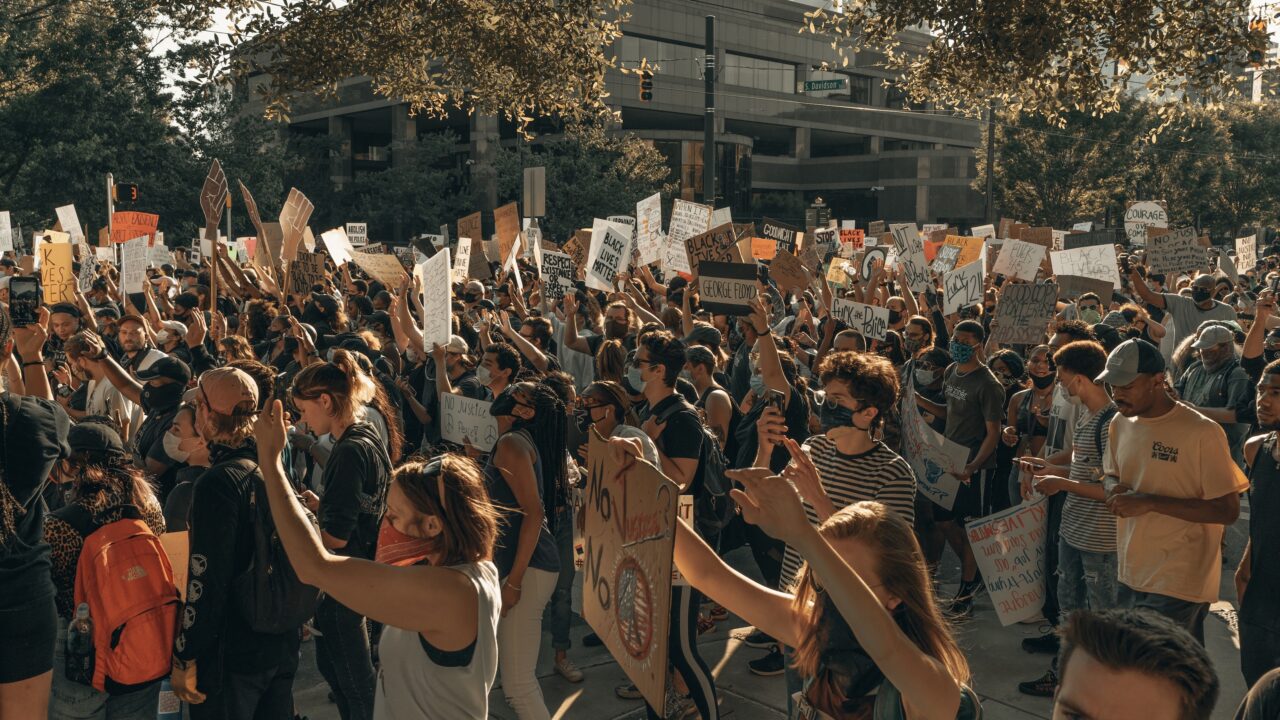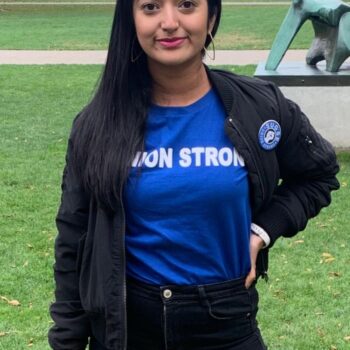It was a blistering May afternoon in Providence, four days after the protests against police brutality erupted in Minneapolis and spread quickly across the country. We were assembled at the Rhode Island State House for a socially-distant car rally, the first public event of our new organization: Reclaim Rhode Island. In the weeks leading up to the rally, we’d carefully lined up speakers, called through our lists, and crafted signs and slogans for our campaign for a People’s Budget. We were ready to make our debut.
Just before our rally was scheduled to start, a large and spontaneous Black Lives Matter march converged on the State House. As we stood baking in the parking lot, our car rally suddenly felt tactically obsolete. The demands on our signs — “Tax the Rich,” “No Cuts” — were still relevant but now seemed slightly off-key. We canceled the rally on the spot and joined the march. In the weeks that followed, the movement for racial justice pushed our fledgling organization forward in ways we couldn’t have imagined. But meeting the moment has required flexibility, humility, and a willingness to articulate our principles on new terrain.
We had founded Reclaim Rhode Island shortly after Bernie Sanders suspended his campaign. “We” were a group of roughly eighteen Rhode Island for Bernie volunteers. During the primary season, our entirely volunteer-led hub had organized two large rallies and sent four packed buses and a constant car caravan to canvass New Hampshire and Massachusetts. Our operation was critical to both states’ campaigns. But with Biden suddenly all but seizing the nomination and coronavirus turning the world upside down, we had lost the opportunity to work on the campaign we’d been waiting for: winning Rhode Island.
As the pandemic surged, the importance of the policies we’d been fighting for on the Bernie campaign, like Medicare for All and a social safety net, only became clearer. For us, the Bernie campaign had never been about a candidate, but about a vision for a cooperative, just society. Its distributed organizing strategy enabled Rhode Islanders who had never been involved in politics to take on responsibility and gain new confidence in collective action. We had a core of strong lead organizers who worked well together and a list of hundreds of Rhode Islanders who had done significant volunteer work. If we did nothing, that fledging infrastructure would have disappeared. Instead, we decided to continue developing local leaders to fight for the Bernie campaign’s platform in Rhode Island.
We imagined an organization based in state legislative districts across Rhode Island that could run and win both issue-based and electoral campaigns. As comrades in DSA have argued, the Left needs to organize at the state level in order to effectively counter corporate and right-wing power. While many leftist organizations have secured important victories at the municipal level, few are building statewide power.
In a flurry of Zoom meetings in mid-April, we began to build an organization based on this ambitious blueprint. In our first weeks, we elected a Steering Committee, called through our volunteer lists, held an online launch convention, and developed our first campaign. Our state faced an estimated $800 million budget shortfall due to the pandemic. Our Democratic governor, Gina Raimondo, had threatened harsh austerity measures in response, at a moment when ordinary people depend on public services more than ever. So we decided that our first campaign would be a fight for a People’s Budget, one that taxed the rich and fully funded public services.
In some ways, the movement that emerged in response to the murders of George Floyd, Breonna Taylor, and Ahmaud Arbery magnified the challenge of adapting a presidential campaign to issue-based organizing. While the presidential campaign had a clear goal and definitive timeline, our organization needed to develop local targets and staying power on shifting terrain. At first, it was difficult for us to connect the dots between our goals for the People’s Budget and the movement for racial justice. But gaining our momentum during the uprisings meant that the demands around the budget became clearer and more powerful than we could have hoped.
Instead of robotically attempting to apply the Bernie platform at the state level, we have spent our first months making connections with other individuals and organizations who are mobilizing around racial and economic justice. We have worked to amplify the demands to divert municipal funds from policing to public services formulated by community members and local progressive organizations. In Providence, we have supported the organizations that are leading city-level budget efforts, including the Black youth-led organization PROVX. Statewide, we have co-sponsored a Defund the Police rally, helped to facilitate community forums, and held political education events, including a forum on defunding the police with organizers from Providence, Chicago, Minneapolis, Durham, and Texas and an upcoming Defund the Police Teach-In.
As a statewide organization, we see our main role as helping to lead the fight on the state budget. Here, we’ve worked in coalition with other progressive organizations to develop a proposal for a state-level Justice Budget that divests from state prisons and policing, raises taxes on the rich, and invests in housing and public education. Following the lead of organizers in Providence who have held ward-based meetings to break down the budget and develop community priorities, we are organizing state legislative district-based budget meetings to help communities generate specific divest and invest priorities.
We have also adopted the acutely anti-racist “defund the police” demand as a core facet of our state budget campaign. This demand, which emerged from the movement, has allowed us to connect the broadly social-democratic “no cuts to public services” to the specific oppression of Black and brown Rhode Islanders. If the “no cuts, tax the rich” frame signalled the importance of redistributing wealth to disenfranchised communities, the “defund the police” demand aggressively pushes the state to act differently: to concretely change the way it allocates money and power, to surrender its violent means of privatization and develop its neglected tools for public flourishing. The way to ensure this transformation is to demand together: show us the money.
Our main contribution to this fight is our ability to bring new people into political work and train them to develop their own district teams so that they can push their legislators on the state budget. When we formed Reclaim, we were worried that the pandemic would hamper our recruitment efforts. Instead, we’ve been shocked by how easy it’s been to grow from eighteen to over a hundred activists, roughly half of them dues-paying members, in just a few months. In large part, this is due to the historical moment. People are suffering from the Trump administration’s catastrophic mishandling of the pandemic. They’re newly conscious of the lack of public investments in healthcare, education, and welfare that could have averted disaster. They’re enraged by the murders of Black Americans by police officers. And they see in the uprisings the possibility of radical change. In this context, we’ve found that many Rhode Islanders are looking for ways to take political action and develop new skills.
Social distancing requirements have limited our ability to meet in person, but we’ve found some unexpected advantages to online organizing. It’s easier to get to meetings, and we don’t have to worry about booking rooms. Members with different work schedules in disparate locations can come together for committee meetings, phone banks, and trainings more easily. We can bring in guests from around the country, including Becca Rast, National Field Director of the Bernie 2020 campaign, who recently gave us a training on building district teams. As social distancing constraints have relaxed in Rhode Island, our Culture Co-Directors have begun to organize small-group backyard hangouts so that we can build the trust and friendship that come with face-to-face interaction. These intimate gatherings with virtual strangers are a welcome break from social isolation and a new form of sociality that we hope to continue once we can gather more freely. Political work is hard, but it should be friendly too.
Our first campaign has two goals: to win a just budget, and, in the process, to build a multi-racial organization that centers the working class in an alliance with professionals and the downwardly-mobile middle class. Rhode Island, like most states, is segregated by race and class. One of the benefits of district-based organizing is that it allows us to map the state to identify where we have members and where we need to make new connections. Although our core group of leaders is racially diverse, we recognize that we need to intentionally recruit working-class people of color in order to build a base that reflects the diversity of the working class in Rhode Island. A core group of working-class, POC Reclaim leaders are taking the lead on developing this recruitment strategy.
This intentional base-building is our top organizational priority and has influenced our approach to the upcoming electoral cycle. We’ve endorsed four progressive candidates in districts that are significantly working class and Latinx. These electoral campaigns will, in turn, raise the visibility of our budget demands.
Organizing in this moment does not mean raising awareness — our job is not to educate people about their own suffering — but seizing the opportunity to ignite and sustain the socialist desire to build a better society. Sometimes, this means circulating a petition against state austerity; sometimes, it means co-sponsoring a block party-style rally around defunding the police. Soon, it may involve direct action targeting legislators who refuse to vote “no” on an austerity budget. It’s crucial that leftists engage the electoral arena as a preliminary means of securing the power to transform society. It is also crucial that we find new ways to organize social life that outstrip what the state is currently doing in order to envision a more inclusive and collective future. Reclaim RI hopes to bring people from all neighborhoods and walks of life into that work.


